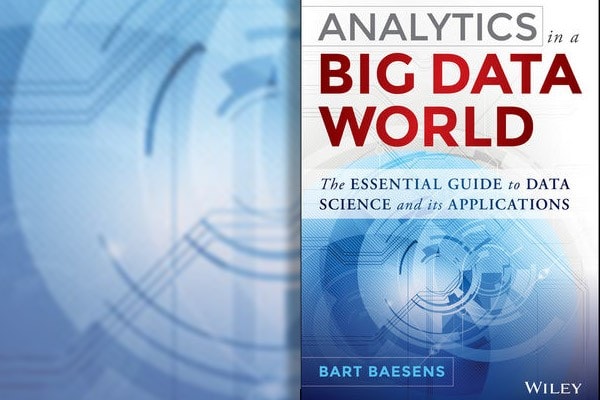The big effects of big data
Interview with author and professor Bart Baesens (Part 2)
This is part two of our interview with author and professor Bart Baesens, who recently published Analytics in a Big Data World: The Essential Guide to Data Science and Its Applications. We caught up with him recently to learn a little about what’s included in the book, what he’s teaching his students, and how analytics is changing the world. (If you missed it, read part one now).
What types of “big data” problems are your students interested in these days?
Bart Baesens: We are currently investing quite a bit of resources into fraud analytics. We study it in a credit card, insurance and public context. As I mentioned earlier, we are doing plenty of research on using social network analytics for fraud detection. Another topic we are currently working on is recommender systems. In this context, we have developed some interesting (neural network based) approaches to combine business knowledge (which is typically available in any business setting) with models learned from data.
Another exciting application area we study is process analytics. Today’s organizations use a plethora of information systems to support their business processes. Such support systems often record and log an abundance of data, containing a variety of events that can be linked back to the occurrence of a task in an originating business process.
Process analytics uses these event logs as the cornerstone of analysis and aims to derive knowledge to model, improve and extend operational processes “as they happen” in the organization. I believe this will be a very popular application of analytics in the next five years.
Finally, we have also started to explore the area of HR analytics, where analytics is used to study employee performance and retention.
From a technical perspective, we continue our work on rule extraction, neural networks and are currently also betting high on survival analysis, which I believe has a lot of potential in many business settings. For an overview of our research, visit www.dataminingapps.com.
We are currently collaborating with the Belgian government to use analytics to detect social security fraud. By having high-performing analytical models, we found fraud can be substantially reduced, which means social security benefits can now be better allocated.
Bart Baesens
Professor and Author
KU Leuven in Belgium and
University of Southampton
Do you find that the younger generations see big data differently? Can you give a few examples?
Baesens: The younger generations are not always aware of the challenges and dangers that come with big data. Privacy here is a key issue to consider. I sometimes get frightened to see what younger generations publish on their social media, without being aware how they expose themselves to the outside world. I have seen this even with PhD applicants, who are surprised that future employers carefully check out all their publically available information. The key message to the younger generation is education. New technology brings new challenges, and they should be properly educated to use it wisely and critically.
We hear a lot about how big data is influencing businesses. How do you see it influencing consumers? Or how might the analysis of big data help make positive changes for consumers?
Baesens: Sure, it does, in many ways. Just think about recommender systems. When you want to buy a product or service from an online retailer, you are often frustrated because of the many choices and configurations possible. Thanks to an intelligent, analytical recommender system, purchases (and their customer feedback) are continuously monitored to better tailor future recommendations to customers.
Another example is a credit card fraud detection system. I’ve personally had a credit card transaction blocked because an analytical application (based on neural networks, by the way) indicated successfully that I was a victim of fraud. Finally, credit risk analytics provides a lot of benefits to consumers. In fact, thanks to credit risk analytics, our savings money is now efficiently safeguarded since every bank is obliged (via the Basel III capital accord) to analytically estimate credit losses and make sure it has enough provisions or equity buffers for worst-case scenarios.
Likewise, how do you foresee the use of big data in government or nonprofit sectors improving society? Can you give a few examples?
Baesens: Sure! In Belgium, we are currently collaborating with the Belgian government to use analytics to detect social security fraud. By having high-performing analytical models, we found fraud can be substantially reduced, which means social security benefits can now be better allocated. Besides that, analytics is used more and more to detect tax evasion fraud.
Finally, we have done lots of work using analytics for micro-finance. Micro-finance is the type of finance whereby entrepreneurs or small firms, typically in third-world countries, can get access to small amounts of funding, enough to start their business and create some local prosperity. If credit risk is properly accounted for here also, I believe analytics can be a great aid for these beneficial programs, which can provide a lot of economic impact.

More Insights
- Analytics in a Big Data World draws on author Bart Baesens' expertise on the topics of big data, analytics and its applications in credit risk, marketing and fraud. Designed to be an accessible resource, this essential book does not include exhaustive coverage of all analytical techniques, but focuses on analytics techniques that really provide added value in business environments.
- Want to learn more about Professor Baesen's latest research? Follow his work at Data Mining Apps.